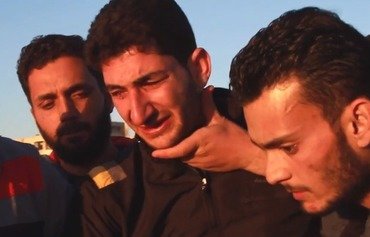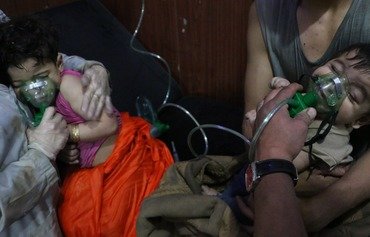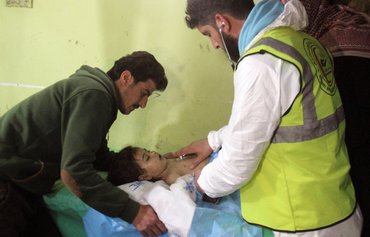A suspected gas attack on a town in Syria's Idlib province which on Tuesday (April 4th) killed at least 58 civilians, including children, has sparked global outrage and calls for an investigation.
If confirmed, the attack would be one of the worst chemical attacks since the start of Syria's war.
The Organisation for the Prohibition of Chemical Weapons (OPCW) on Tuesday said it was "gathering and analysing information from all available sources" about the suspected gas attack.
The OPCW "is seriously concerned about the alleged chemical weapons attack reported by the media this morning in the Khan Sheikhun area of southern Idlib", the global chemical watchdog said in a statement.
![Syrian children wait to receive treatment at a makeshift clinic following reported airstrikes by regime forces in the opposition-held town of Douma, on the eastern outskirts of Damascus, on April 4th. [Abd Doumany/AFP]](/cnmi_di/images/2017/04/04/7586-syria-chemical-attack-600_384.jpg)
Syrian children wait to receive treatment at a makeshift clinic following reported airstrikes by regime forces in the opposition-held town of Douma, on the eastern outskirts of Damascus, on April 4th. [Abd Doumany/AFP]
According to the Syrian Observatory for Human Rights, the attack on a residential part of Khan Sheikhun came in the early hours of Tuesday, when a warplane carried out strikes that released "toxic gas".
It said 11 children were among the dead, with at least 160 injured, and that many people were dying even after arriving at medical facilities.
In addition to those killed, dozens were experiencing breathing problems after the incident, which also caused symptoms such as vomiting, fainting and foaming at the mouth, the Observatory said.
The Observatory could not confirm the nature of the gas or who was responsible for the strikes.
Hospital hit in further strikes
A hospital where doctors were treating victims of the attack was hit by two airstrikes after the initial attack, bringing down rubble on top of medics.
The Observatory said military aircraft hit near the hospital but could not confirm whether anyone was hurt or killed.
A White Helmets rescue organisation centre next door also was hit in the strikes.
After the initial attack, "ambulance units moved out as soon as they received reports of casualties", White Helmets member Wassim Junaid told Diyaruna. "The teams were surprised by the strong smell of gas."
Junaid said he was "with the first teams to arrive at the site and witness dozens of people suffering from suffocation and inability to breathe, with redness in the eyes and face".
"Most of those injured were civilians, especially children and women," he said.
"Due to the limited means available, quick measures were taken that included spraying clean water on the injured with hoses to remove any traces of gas, as well as removing their clothes and washing them naked to make sure that all gas traces have been removed," he said.
Several people in acute respiratory distress were administered artificial respiration measures, he added.
Khan Sheikhun resident Salah Othman, 50, told Diyaruna he "rushed like other people to the place that was hit in the air raids".
"The scene was painful beyond every imagination, with bodies lying everywhere and the air filled with the screams of those hurt," he said.
"I may never be able to erase the scenes I saw from my memory, especially the children’s screams," he added.
Calls for an investigation
The Idlib province town is largely controlled by an opposition alliance, and has been a regular target of regime and allied airstrikes.
Syria's leading opposition group, the National Coalition, accused the regime of being behind the attack, and called on the UN Security Council to convene an emergency session and "open an immediate investigation" into the attack.
The UN Security Council is set to meet Wednesday to discuss the attack.
A senior Syrian security source denied claims of regime involvement as a "false accusation", telling AFP that opposition forces were trying to "achieve in the media what they could not achieve on the ground".
French Foreign Minister Jean-Marc Ayrault described the attack as "monstrous".
EU diplomatic chief Federica Mogherini on Tuesday said the Syrian regime bears "primary responsibility" for the attack.
"Today the news is awful," Mogherini said in Brussels, on the sidelines of a EU-UN conference that was meant to focus on the post-conflict situation in Syria.
"Obviously there is a primary responsibility there of the regime because it has responsibility of protecting its people not attacking its people," she added.
Regime ally Russia denied responsibility for the attack, with the Russian defence ministry saying Tuesday it did not carry out any strikes near Khan Sheikhun.
Turkish President Recep Tayyip Erdogan in a phone call with Russian counterpart Vladimir Putin on Tuesday condemned the attack as an "inhuman" strike that could endanger peace talks based in the Kazakh capital.
Repeated toxic arms allegations
The Syrian regime officially joined the Chemical Weapons Convention and turned over its chemical arsenal in 2013, as part of a deal to avert military action.
But there have been repeated allegations of chemical weapons use by the regime since then, with a UN-led investigation pointing the finger at the regime for at least three chlorine attacks in 2014 and 2015 .
The regime denies the use of chemical weapons and has in turn accused opposition fighters of using banned weapons.
Tuesday's attack comes just days after regime forces were accused of using chemical weapons in a counter-offensive in neighbouring Hama province.
Set up in 1997 to eliminate chemical weapons, the OPCW has deployed numerous missions to Syria since 2014 to monitor allegations of the use of toxic arms.
In a report to the UN Security Council in March, OPCW director general Ahmet Uzumcu said "eight incidents of alleged use of chemical weapons have been recorded since the beginning of 2017 and are currently being analysed".
Fact-finding missions were already investigating incidents in eastern Aleppo city, western rural Aleppo, South Homs and North Hama, rural Damascus and Idlib, the report said.

![Syrian children receive treatment at a small hospital in the town of Maaret al-Noman following a suspected toxic gas attack in Khan Sheikhun on April 4th. [Mohamed al-Bakour/AFP]](/cnmi_di/images/2017/04/04/7585-syria-chemical-child-600_384.jpg)






